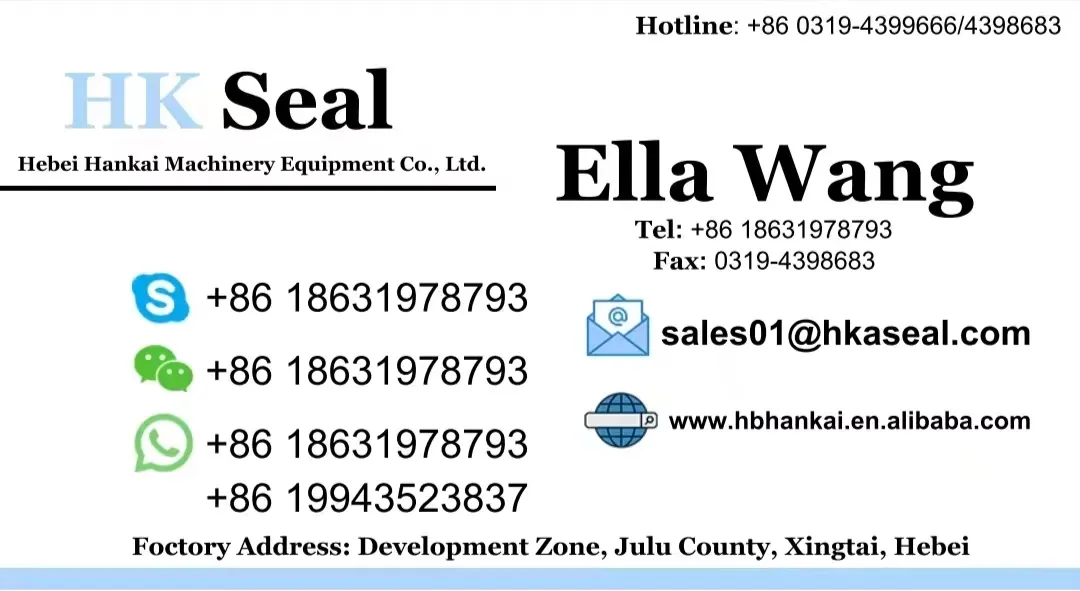Dec . 05, 2024 15:18 Back to list
High Temperature Shaft Seals for Enhanced Performance in Extreme Conditions
High Temperature Shaft Seals An Essential Component in Industrial Applications
Shaft seals are critical components in various machinery and equipment, playing a vital role in preventing fluid leaks, protecting internal components, and enhancing overall efficiency. This is especially true for high-temperature environments, where the challenges posed to shaft seals are multi-fold. High temperature shaft seals need to withstand elevated temperatures while maintaining their mechanical integrity and sealing performance, making their design and material selection crucial for effective operation.
Importance of High Temperature Shaft Seals
In industries such as oil and gas, aerospace, automotive, and manufacturing, equipment often operates at elevated temperatures. The failure of shaft seals in these conditions can lead to catastrophic leaks, equipment malfunction, and costly downtime. High temperature shaft seals are designed to perform reliably in these challenging environments, ensuring that mechanical systems operate smoothly without loss of performance or efficiency.
Material Considerations
The materials used in high temperature shaft seals must possess properties that enable them to endure extreme conditions. Common materials include fluorocarbon (Viton), silicone, and occasionally, metal-based materials for special applications. Fluorocarbon seals are resistant to high temperatures (often exceeding 200°C or 392°F) and offer excellent chemical resistance, making them suitable for many aggressive liquids and gases. Silicone seals, on the other hand, can handle higher temperatures (some grades exceed 250°C or 482°F) but may not have the same chemical compatibility as fluorocarbon.
The choice of material also depends on the specific application, including the type of fluid being sealed, potential exposure to chemicals, and the mechanical stresses involved. Understanding the operating environment and selecting the right material are paramount to ensuring seal longevity and reliability.
high temperature shaft seals

Design Considerations
Apart from material selection, the design of high temperature shaft seals plays a critical role in their effectiveness. The design must account for thermal expansion, compression set, and potential breakdown of sealing surfaces under extreme conditions. Well-engineered seals minimize friction and wear between the shaft and seal, which is essential for high-speed rotary applications.
Additionally, the seal’s geometry can influence its performance. For instance, a lip seal design can provide a dynamic sealing action, while O-rings might be advantageous in static applications. Engineers often utilize computer-aided design (CAD) software to simulate and optimize the seal's performance before actual production, ensuring that seals can withstand the rigors of their intended applications.
Applications
High temperature shaft seals are found in a wide range of applications. In the automotive industry, they are used in engines and transmissions where temperatures can soar during operation. In aerospace, these seals are integral to jet engines, preventing leakage of fuels and lubricants. The oil and gas sector also relies heavily on high temperature seals in drilling operations and refineries, where extreme conditions are the norm.
Conclusion
As industries continue to push the boundaries of heat generation in their machinery and processes, the demand for high temperature shaft seals will only increase. Innovations in materials and design will help improve the performance and longevity of these seals, ultimately driving efficiency and reliability in various applications. By selecting the appropriate materials and designs tailored for specific conditions, manufacturers can ensure that their equipment remains operational, safe, and efficient in high-temperature environments. Adapting to these challenges is crucial for maintaining productivity and minimizing the risk of failure across a multitude of sectors.
-
TCN Oil Seal Metal Ring Reinforcement for Heavy Machinery
NewsJul.25,2025
-
Rotary Lip Seal Spring-Loaded Design for High-Speed Applications
NewsJul.25,2025
-
Hydraulic Cylinder Seals Polyurethane Material for High-Impact Jobs
NewsJul.25,2025
-
High Pressure Oil Seal Polyurethane Coating Wear Resistance
NewsJul.25,2025
-
Dust Proof Seal Double Lip Design for Construction Equipment
NewsJul.25,2025
-
Hub Seal Polyurethane Wear Resistance in Agricultural Vehicles
NewsJul.25,2025
-
The Trans-formative Journey of Wheel Hub Oil Seals
NewsJun.06,2025
Products categories
















